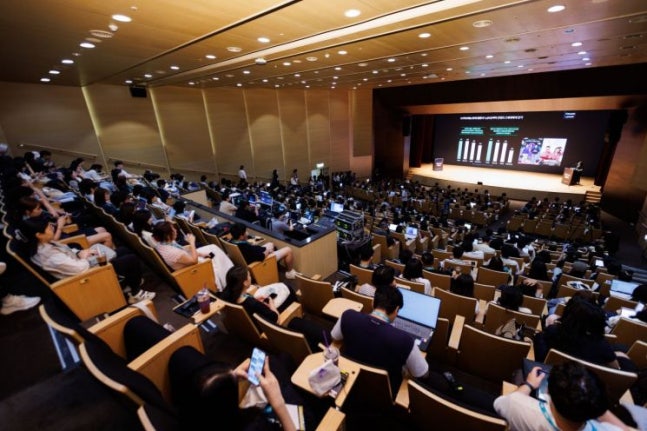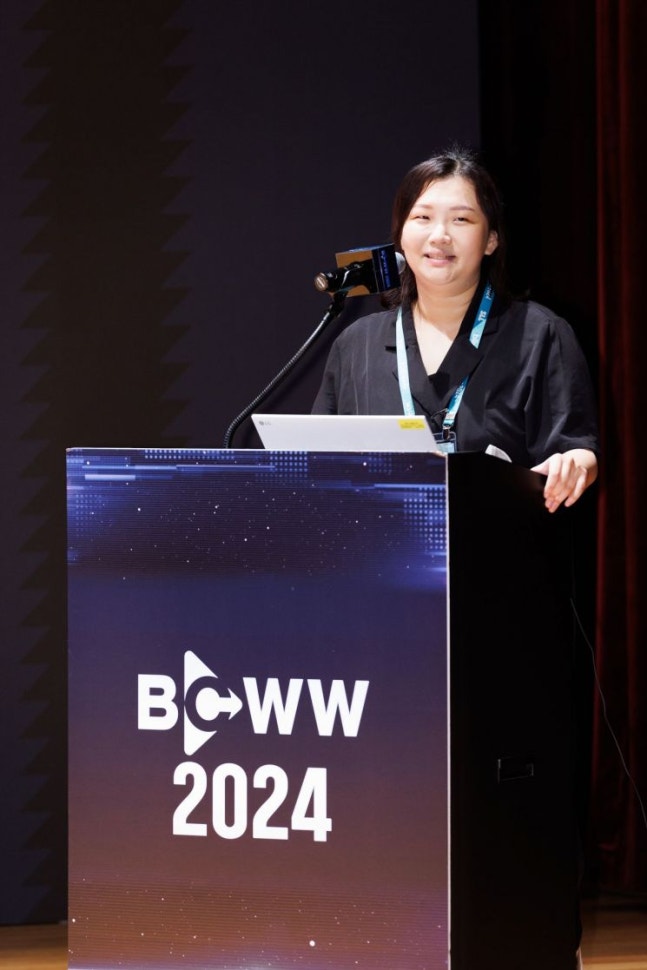BCWW releases report on content consumption trends
Strong preference for contextless stories
Basic viewing at 1.5x and skipping… 2x speed is more than enough
AI content viewed negatively as “low quality and lacking depth”, ‘Survey results show that Generation Z (ages 15-29) prioritize entertainment over narrative coherence in content consumption.’,
,
,

,
,
, “The Korea Creative Content Agency and Central Group announced the results of the ‘Gen Z Content Usage Trend Study’ at the ‘Broadcasting Content Worldwide (BCWW) 2024’ held in COEX, Samseong-dong, Gangnam-gu, Seoul on the 28th. It’s a report analyzing Generation Z’s content consumption trends. The study surveyed about 1,500 people aged 15 to 69 nationwide, from the 15th to the 25th of last month, on their preferences for topics, genres, viewing time, etc.”,
,
, ‘According to the report, over 40% of Generation Z prioritize interest over the validity of content in watching dramas and movies. They also indicated that in variety shows and webtoons, it’s okay for humor to induce laughter even if coherence or realism is lacking. This trend was even more pronounced in games. Over half preferred a world with rich imagination and strange stories, rather than realistic settings.’,
,
, ‘The preference for contextless stories was also evident in the use of YouTube and TikTok. 43% of Generation Z said they enjoyed absurd or nonsensical content. Kim In-ae, a senior researcher at the content research institute, explained, “Trends such as the ‘ cat-snake challenge ‘ and the ‘ spicy hot pot fruit challenge ‘ that were popular in the first half of the year are representative examples” and added that “this sharply contrasts with the Baby Boomer generation which stopped at 28%.”‘,
,
, ‘Generation Z’s unique characteristics were also evident in the subject matter and settings of the content. More than half embraced virtual elements that could exist in reality. Hwang O-yeong, JTBC’s head of central investment, cited dramas like ‘ Carrying Sunjae ‘ and ‘ She Who Is Different Day and Night ‘ and ‘ I’m Not a Hero ‘ as successful cases. “Each of them captivated the audience with a unique narrative that navigates between reality and fantasy and creates a mysterious atmosphere,” he explained. “They captured the attention of Generation Z, who prefer entertainment.”‘,
,
, ‘Immersiveness is crucial in balancing between reality and fantasy. Genres that require deduction and romance in entertainment are important. Engaging viewers to become the characters themselves is essential in directing. Director Hwang said, “The first half of the year saw high popularity with shows like ‘Crime Scene Rises’, ‘Siblings in Love’, and ‘High School Mystery Class 3’.”‘,
,
, ‘Generation Z also showed a tendency to be attentive to others’ reactions. They felt greater empathy and interest in content when they received similar responses. Conversely, when faced with contrasting reactions, they sought more reactions on platforms like YouTube, Instagram, and X (formerly Twitter) to reassess their own thoughts.’,
,
, ‘Kim, the researcher, cited ‘ Spring in Seoul ‘ as an example of content that fits the former category. “A challenge emerged where viewers measured their heart rate and stress levels while watching and certified it on social networking services (SNS),” she said. “It served as a milestone that drew in over 10 million viewers.” She further analyzed, “The desire for empathy and communication leads to an actively expressed form of ‘fandom,’ where people with similar tastes share emotions and communicate frequently.”‘,
,
,

,
,
, ‘Consuming content in seconds is a key feature of Generation Z. Watching at faster speeds and skipping are basic practices. A significant number of people experience content at 1.5x speed. There are also many cases of enjoying content at 2x speed. Director Hwang said, “The reason for this is more about not being able to endure boredom than about saving time.”‘,
,
, ‘This trend was also evident in news consumption. They preferred simple understanding of essential information over comprehensive details. Director Hwang analyzed, “43% of Generation Z using YouTube news collected information in shorts,” stating that “they wanted to quickly grasp hot topics and react sensitively.” He further said, “In dramas and variety shows, they preferred ‘chunked content’ that quickly provided essential information.”‘,
,
, ‘They presented contradictory aspects regarding artificial intelligence (AI). While they trust and utilize content recommended by algorithms more than other generations, they were the most negative towards AI content. Kim, the researcher, stated, “They viewed AI content as of lower quality compared to the Baby Boomer generation,” and said, “It was seen as lacking depth in intricate aspects, making it difficult to trust.” She interpreted this as, “This indicates a high level of expectations and demands for AI results.”‘,
,
,

